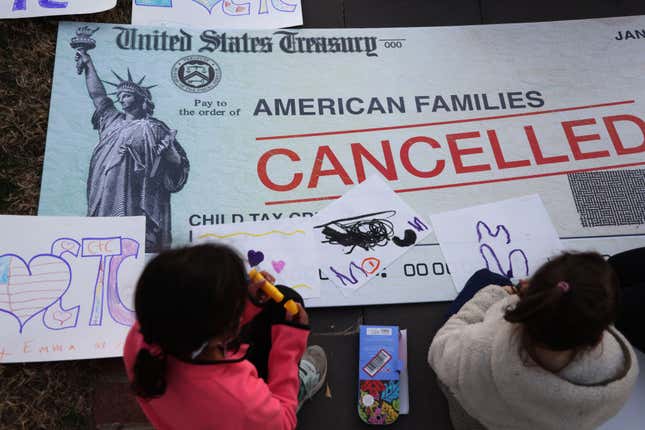
Despite evidence that low-income families receiving cash helps the brains of infants and parents being able to do things like pay down debt, be food secure, and have clothing, the expanded child tax credit came to an end on January 15. Around the country, families are figuring out how to bridge the financial gap losing the extra $200 or $300 a month passed in the American Rescue Plan in March of 2021.
One example is a mother from Milwaukee as told by NBC News:
“I received $500 and every month I figured out what the household needed, whether it was gas, school supplies, toiletries, rent or the electric bill — whatever,” said Savanah Brooks, 36, the Milwaukee mom who gave birth to her daughter earlier this month after having to take unpaid time off work because her pregnancy was considered high risk. “It gave us just a little cushion and made life a little easier.”
When it comes to provisions like extended unemployment benefits, the child tax credit, or anything that the government gives with no strings attached, there’s an implicit bias that the recipients didn’t earn it. But with the U.S. being a rich country not guaranteeing paid leave or workers getting sick with COVID and having the time they miss unpaid–the least we can do is provide low-income families a small break.
Another example is Kristen Olsen, 41, the West Virginia mom of three. She’s struggling with child care costs, a $75 increase of rent, and inflation hitting groceries.
“It’s like saying, ‘Here’s how your life could be, this is what it would be like if you didn’t have to worry so much every month, here’s how it feels to know you can pay your bills,’” she said, “and then they just pull the rug out from under you.”
If the consensus is our country cares about children, then a priority is to extend this credit. The United States ranks one of the lowest in relation to other countries and how they invest in families. Before the expansion, 23 million children didn’t qualify because families didn’t meet the income threshold. Extending the expanded credit could be a positive point for the Biden administration – and frankly, they don’t tout it as an achievement enough.
As the state of the Build Back Better bill is in limbo, so is any movement on the extension. Sen. Manchin proposed work requirements for families that receive the expanded child tax credit, and he has signaled his desire to lower the income threshold. I’m not exactly sure who he thinks is benefitting from the credit the most. For 2021, under $75,000 for single filers, $112,500 for heads of household, and $150,000 for those married filing jointly. In West Virginia, the state Manchin represents, one in four children live in poverty. His opposition to the income threshold is baffling, given West Virginians would benefit from it.
Sen. Mitt Romney (R-Utah) proposed a child tax credit form, but the payments would come from slashing federal welfare and social programs. As Congress debates how to get this through, single parents and families wonder how to pay for meals or what to do about rising rents. To many Americans, everything has a caveat. Get a job, but we won’t raise the minimum wage to help you. Get a college degree, but take out loans with excessive interest rates to make tuition. Now, it’s we gave you money for half of a year, but you’ll have to make due with no help from us.

